Better than a fairytale ending
Updated: 2016-04-06 08:14
By Mei Jia(China Daily)
|
||||||||
The Hans Christian Andersen Award, regarded as the 'Nobel Prize for children's literature', has been bestowed upon to Cao Wenxuan, the first Chinese to win. Mei Jia reports.
Children's literature writer Cao Wenxuan, 62, has won the Hans Christian Andersen Award for his work, the International Board on Books for Young People announced at the Bologna International Children's Book Fair in Italy on Tuesday.
With this award, Cao becomes the first Chinese to claim the world-renowned "Nobel Prize for children's literature".
The win has sparked a wave of excitement among the country's publishing professionals.
"The unanimous choice of the jury, Cao writes beautifully about the complex lives of children facing great challenges," the IBBY jury says in a news release.
"Cao is a great example of how writing wonderful prose and telling stories about brave children facing tremendous difficulties and challenges can attract a very wide and committed child readership as well as helping to shape a literary tradition in China that honors the realities of children's worlds," it adds.
The award is the highest international recognition given to living authors and illustrators of children's books for their whole body of work since 1956. Every year it honors one author and one illustrator.
Out of a short list of five in each category, Cao has won with German illustrator Rotraut Susanne Berner this year.
"What I tell are genuine Chinese stories, which can be read as stories for all human beings. I suppose that's why I'm winning," Cao tells the Chinese media.
"I don't write for a certain audience. When I write, I consider only the language, style and artistic nature of my words," he adds.
Over the years, many Chinese writers and illustrators have been nominated, but none of them has got this far.
In 2013, the China Children's Press & Publication Group, one of Cao's main publishers, held a conference with writers and international publishers to discuss the chances of a Chinese winning the Andersen award.
Jin Bo, a renowned children's book writer born in 1935, says at the conference that he was nominated as early as in 1992, but missed out due to "limited translations of my works then", he says.

But Jin predicted that a Chinese author would soon win, and he mentioned Cao, saying that Cao's The Straw House had sold 8 million copies then, and that many of Cao's titles had been translated into many languages.
Putting the achievement into perspective, Zhang Mingzhou from the publishing group tells the Chinese media: "Cao's win is a historic breakthrough for a country with such a large youth readership."
The group alone sold a total of 140 million copies of children's books in 2015, worth 550 million yuan ($85 million).
And in 2014, the country released 40,000 new titles for children.
In another breakthrough, Wu Qing, the daughter of literary master Bing Xin and former professor at Beijing Foreign Studies University, was on the jury this year, as the first Chinese critic to make it to the judging panel.
Cao was born into a poor family in Jiangsu province, and his childhood memories were mainly connected with his family's struggles for food.
"I remember that I used to collect grass from the riverside, and my mother would stir-fry it without oil pretending that she was preparing a dish of leeks for me," Cao writes.
He enrolled in Peking University in 1974 and stayed on as a professor of Chinese language and literature.
Besides The Straw House, first published in 1997, Cao is also known for Bronze and Sunflower (2005), which tells the story of a village boy and a city girl, who are struggling to find their place in the world.
His Dingding Dangdang series, which he began in 2012, is about two brothers with Down syndrome living in a small village.
Separately, Cao is also working with world-acclaimed illustrators to create picture books for young readers. He partnered with Andersen-winning Brazilian illustrator Roger Mello on Feather.
"Cao's books don't lie about the human condition; they acknowledge that life can often be tragic and that children can suffer. At the same time, they can love and be redeemed by their human qualities and the kindness they sometimes find when they are most in need," the IBBY statement says.
Commenting on his achievement, children's writer and critic Li Donghua tells China Daily: "Cao is a respected writer, who has published super best-sellers, but he remains untouched by market trends.
"He's indeed a marathoner in writing for children," says Li.
Contact the writer at meijia@chinadaily.com.cn
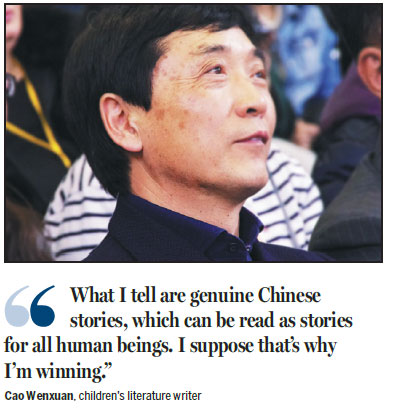
(China Daily 04/06/2016 page18)
- Xi: Talks 'only correct way' for China, ROK
- Xi to Obama: Disputes should be managed
- Cypriot court remands in custody man suspected of hijacking EgyptAir flight
- Govt eyes luxury tourists amid concerns over safety
- Sleep tight and don't let sharks bite at Paris aquarium
- Aung San Suu Kyi appointed as Myanmar's new foreign minister

 Microsoft embraces artificial intelligence
Microsoft embraces artificial intelligence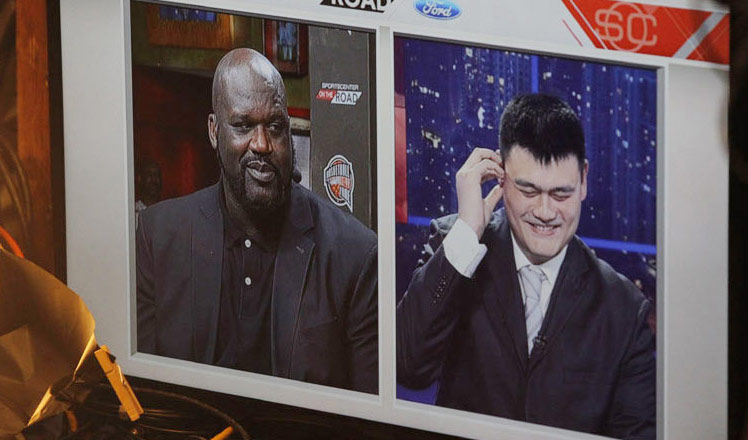
 Yao Ming introduced to Hall of Fame
Yao Ming introduced to Hall of Fame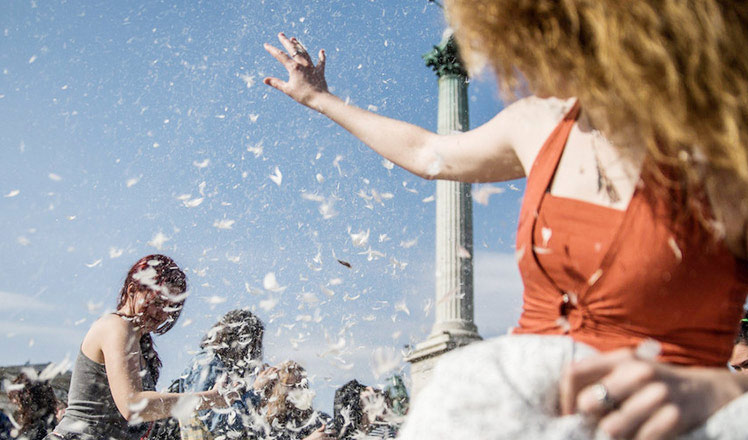
 The world in photos: March 28 - April 3
The world in photos: March 28 - April 3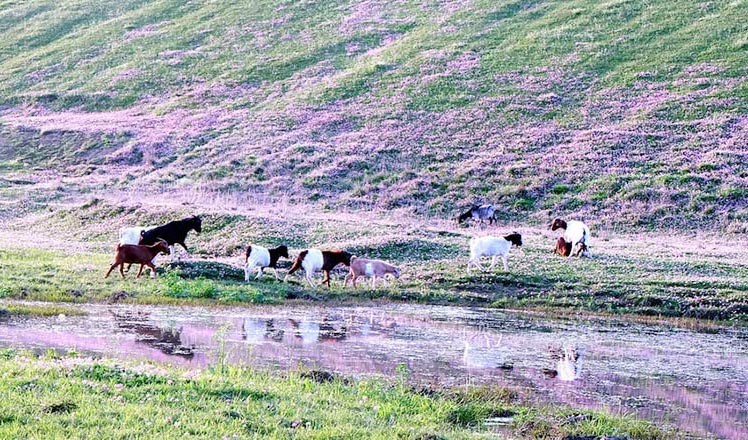
 Discover beautiful China in spring blossom (V)
Discover beautiful China in spring blossom (V)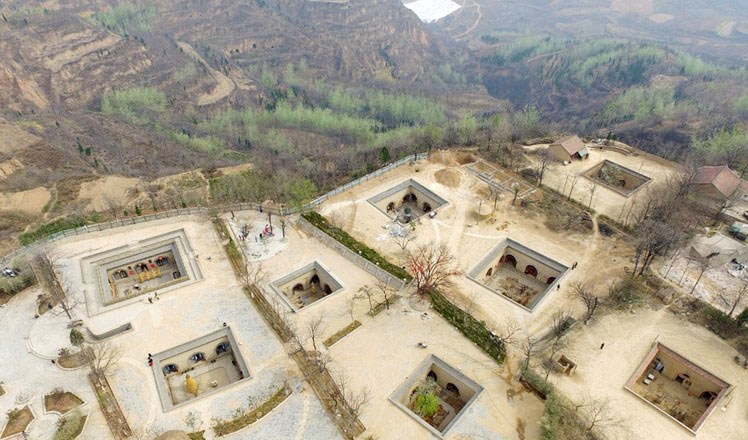
 'Pit yards' to open to visitors
'Pit yards' to open to visitors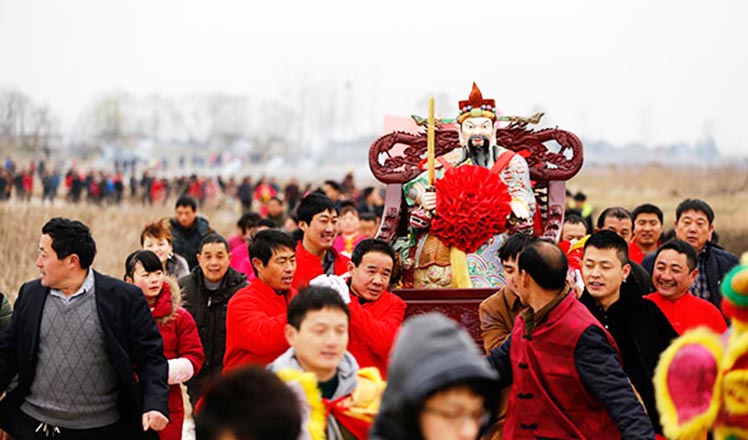
 Ancestral temples continue to bring family members together
Ancestral temples continue to bring family members together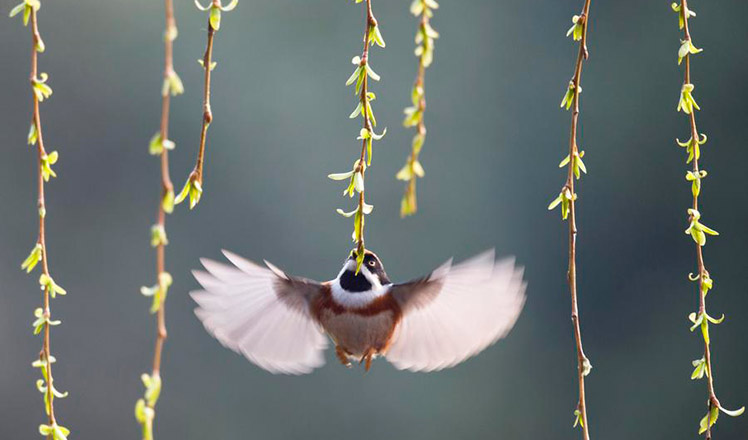
 Culture Insider: 8 things you may not know about Clear and Bright
Culture Insider: 8 things you may not know about Clear and Bright
 Discover beautiful China in spring blossom (IV)
Discover beautiful China in spring blossom (IV)
Most Viewed
Editor's Picks

|

|

|

|

|

|
Today's Top News
Marriott unlikely to top Anbang offer for Starwood: Observers
Chinese biopharma debuts on Nasdaq
What ends Jeb Bush's White House hopes
Investigation for Nicolas's campaign
Will US-ASEAN meeting be good for region?
Accentuate the positive in Sino-US relations
Dangerous games on peninsula will have no winner
National Art Museum showing 400 puppets in new exhibition
US Weekly

|

|







